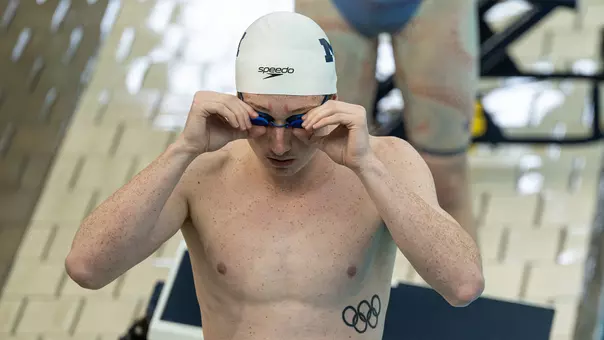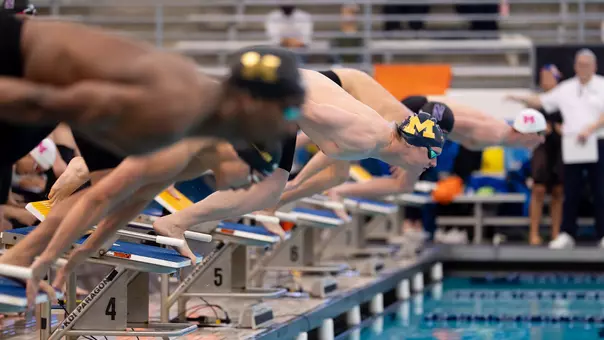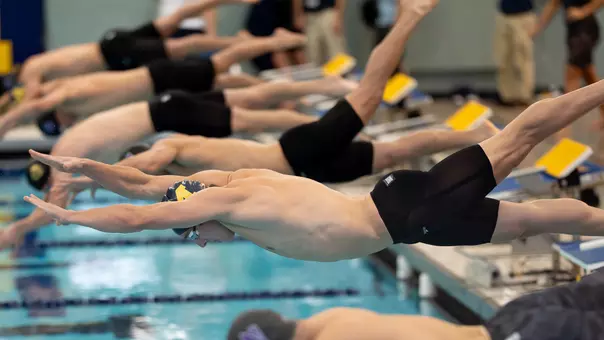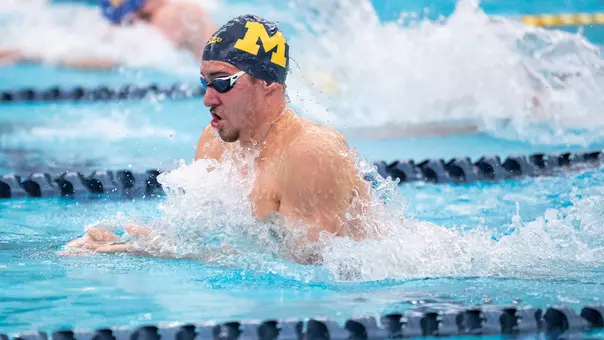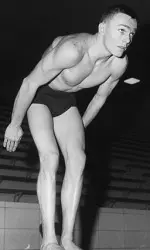
Future Friday: Q&A with Frank Legacki
8/21/2015 12:00:00 AM | Men's Swimming & Diving
Aug. 21, 2015

Frank Legacki
For a three-year stretch, Frank Legacki (1959-61) was one of the best and most versatile swimmers in the country. He twice set the American record in the 100-yard butterfly, and was a three-time NCAA champion, winning the 100-yard freestyle in 1959 and the 50-yard freestyle in 1961. Legacki also helped Michigan win national team championships in 1959 and 1961. His passion for swimming continued after his collegiate career ended, as he served as head coach of the Ann Arbor Swim Club while pursuing his MBA.
After graduating, Legacki spent a long and distinguished career in business, including positions in advertising, marketing and consulting. He was inducted into the Michigan Hall of Honor in 1994 and, along with his wife, Alicia Torres, moved back to Ann Arbor permanently in 1998.
The 150th Anniversary of Michigan Athletics continues throughout the 2015-16 academic year. To join the conversation, go to mgoblue.com/goblue150 and use #GoBlue150 on Twitter. To provide feedback and story ideas, use this online form.
Q. How did you get interested in swimming?
A. It's such happenstance that I went out for swimming. I grew up in a tough neighborhood in South Philadelphia and went to high school with 5,000 boys. I was 14 years old. I got off the trolley car one day and see two guys walking towards me with towels draped under their arms. I asked them where they were going and they said, 'Going to try out for the swimming team.' I said, 'What swimming team?' North Catholic had a swimming team, apparently, so I said, 'Wait for me!' If that hadn't happened, I might never have known about it. Who knows? About 10 percent of my high school went to college. Half of them flunked out. It was a good, tough Catholic school. The first step was getting a scholarship to a place like Michigan.
Q. Fact or fiction: In 1961, you set the American record in the 100-yard butterfly only 15 minutes after swimming the 50-yard freestyle.
A. That's true. I was in really good shape back then. That came at the AAU Championships, which were tougher because of the international kids. It was more open, more competition. My best stroke was the butterfly. Gus [Stager] gave me the choice. I swam freestyle -- not butterfly -- for Michigan. I only probably swam the butterfly once every year. We had the second- and fourth-best butterflyers in the country and we didn't have any sprinters, so I sprinted freestyle.
Q. Why did you decide to swim at Michigan?
A. The key thing that made me come to Michigan rather than Ohio State came out of a sit-down with my coach at the time. I said, 'Where do you think I should go?' He said, 'You should probably go to Ohio State because you'll have trouble getting through Michigan academically.' That's all I had to hear. I was going to Michigan. That was the key thing. Ohio State had been national champions before that and I liked it there, but boy, that really stuck with me.
Q. What was it like swimming for Gus Stager?
A. At that time, he was the best coach in the world. Those first years he was here, nobody was better. That 1959 team was the greatest swimming and diving team ever. Going into the NCAA Championships that year, the record number of points was 95. We scored 138, more than the next three teams combined. You could have divided us up by classes and we would have gone 1-2-3.
Q. Did you ever have dreams of competing at the Olympics?
A. I did, but I was just not swimming well that year. I was struggling academically and just didn't want to be a dumb jock. My priorities changed. It took about a year, but I started doing well and came back pretty strong as a senior. But my junior year was the Olympic year. I lost my competitive edge there for a bit.
Q. Talk about the training. Obviously that changes as the times change, but were the fundamentals the same?
A. We never did any weight training. After the AAUs, that was it, and you didn't get started back up again until the summer. You would go from April to June without training. Some of the guys started in September. I was in good shape, so I started later, around November or December. I could be in competitive swimming shape within a few weeks. Near the end of the season, Gus worked us a lot, probably four or five hours a day. You would do your distance work in the morning and then have a team practice in the afternoon. He'd bring us down for night practices sometimes so we could work on turns and starts, little things like that.
Q. How different was campus?
A. First off, there were 11 sports back then, not 31. There were no women's sports. Everybody knew everybody. There were a fair amount of international students, but it certainly wasn't as diverse as it is now. In those days, you had one captain by edict and it had to be elected by the team. That was a Fritz Crisler thing. There was a clear definition of leadership. All the athletes were in fraternities. Myself, I was president of Sigma Chi. It's great now, very dynamic. Michigan has not only kept up with the times, but it has led the times. When I see new buildings get put up and all that, it's all part of the dynamism that makes this university great.
Q. Do you still stay close to the program?
A. Oh yes. I still support Michigan swimming and diving and stay updated with the meets. Mike [Bottom] is a good friend. I think what those kids are doing is wonderful. They're great kids, great students. Those individual sports and what those kids do, and as hard as they work, they don't get the recognition they should.
Q. In your opinion, what makes the University of Michigan stand out above the rest?
A. The people here, they want you to succeed. What really helped me was not only focusing on being a highly competitive swimmer, but getting advice and guidance from so many people. They set a standard that's pretty high. That's part of the mentality at Michigan. It's not just in sports, either. You're always competing at a high level when you're here, but there are so many life-building things inherent within that. I love my background and I'm proud of it, but I just love this place. I feel like I was born here.
The Office of Alumni Engagement strives to foster a community, recognize the holistic student-athlete and honor the great Michigan Athletics history. This alumni spotlight illustrates the impact that our alumni are having around the world and how they stay engaged with Michigan.
The 2015-16 academic year marks the 150th anniversary of Michigan Athletics. We invite the University of Michigan family to celebrate the passion that fuels us, rediscover the stories and traditions that unite us, and imagine what the future holds for us. We look forward to celebrating "This Michigan of Ours." To share a memory of Michigan Athletics, please fill out our online form or email goblue150@umich.edu.

